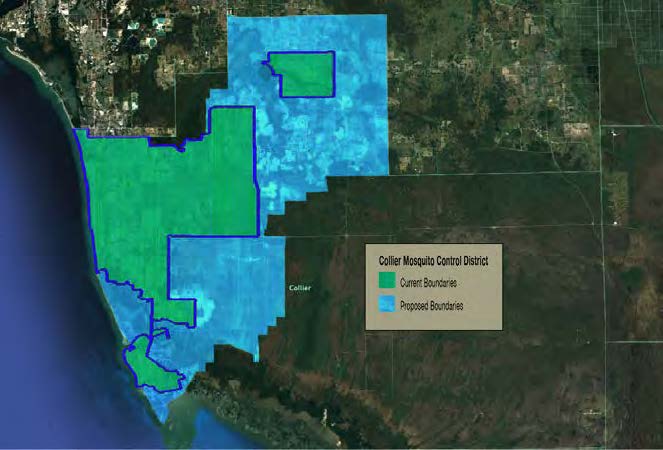Public Health Expansion by Patrick Linn, MS, MSHAPI Ex Director, CMCD
 West Nile virus once again appeared in Collier County this year as scientists steadily found infected
West Nile virus once again appeared in Collier County this year as scientists steadily found infected
mosquitoes in Collier Mosquito Control District’s traps. In fact, the Florida Department of Health issued a
mosquito-borne illness advisory in the county because of the widespread presence.
Protecting public health is the keystone of the District’s mission, and it has been since 1950 when the organization was created to serve the city of Naples – all 6 square miles of it. Since then, Collier County has seen tremendous growth and the District’s boundaries have grown 10 times to provide protection for the community. The most recent occurred in 2004 to include eastern Golden Gate Estates which took the District’s size to 401 square miles.

The District is pursuing another boundary expansion in 2021. A policy established by the District’s five-member board of elected commissioners includes numerous criteria citing the need to expand. The board approved the expansion in July and later that month, the Collier County’s Board of Commissioners approved the resolution. A local bill will now go in front of the Collier Legislative Delegation for consideration in December. From there, the bill goes to Tallahassee for review during the legislative session.
Why expand now? One of the policy’s top criteria is to keep up with the growth of residential areas. Not only is new construction inching closer to the current boundaries, Collier County’s leadership approved the development of three new villages in far eastern Golden Gate Estates this year. Those areas are not within the District’s boundaries, leaving those residents vulnerable to mosquito diseases.
A second important policy point is an increasing threat of mosquito-borne illnesses. Of the 50 known mosquito species in Collier County, five of them are year-round pests with the ability to carry debilitating and deadly diseases. This year, the District’s entomologist identified four mosquitoes new to the area, including the Aedes scapularis, which is of particular concern since it feeds on both humans and animals, vectoring diseases such as yellow fever and Venezuelan Equine Encephalitis.
A third reason cited in the policy is the changing ecology of Southwest Florida. For example, new construction is changing our landscape, often creating more mosquito breeding grounds with stagnant retention ponds, swales, and re-routing waterways. East of Naples, the Picayune Strand is experiencing a long-needed restoration of its wetlands. That area – once flooded – provides the potential for other mosquitoes from the Everglades to bring new diseases closer to residential areas.
An important, and sometimes misunderstood, note about expansion is the District’s mission to control mosquitoes, not to eradicate them. Our control efforts are to reduce some species to tolerable levels and prevent disease transmission from others, including on publicly owned land adjacent to residential areas.
First and foremost, our intention on those lands is to conduct research and determine collaboratively with the land manager if there exists any need for control. If so, a collaborative plan will be put in place to define precisely which efforts are agreed upon to protect the integrity of the public lands.
Have questions about the expansion? Want to know more about mosquito control operations? Looking for someone to speak to your group’s next meeting? Visit the District’s website at cmcd.org or call 239.436.1000.




Leave a Reply
Want to join the discussion?Feel free to contribute!